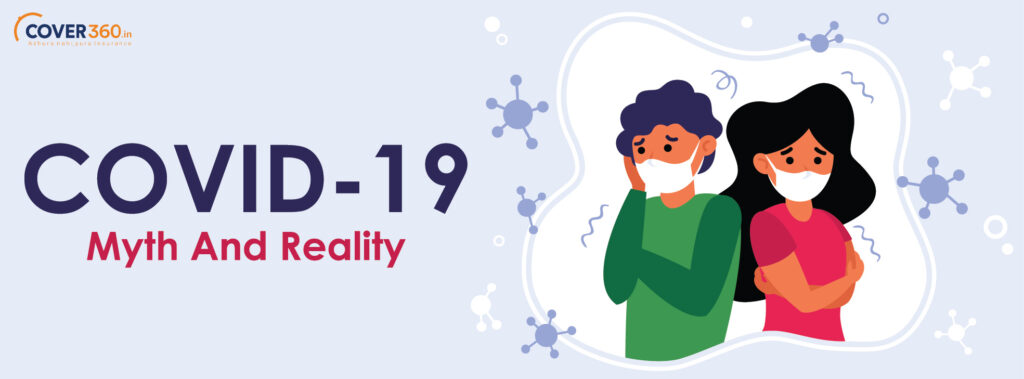Coronavirus has affected a myriad number of people around the world. The virus comes with no signs of ebbing as of now and in view of the gravity of the situation, IRDAI has already introduced health insurance plans to cover COVID-19 related medical costs as well as hospitalization expenses due to coronavirus. Over the last few months, new SARS-CoV-2 variants have been reported from around the globe: first in the UK, then South Africa and Brazil. Now those strains are in the United States and India.
Amid the fearful situation, a wealth of misinformation about Coronavirus new strains also prevails. The reports of increasing cases in India are unsettling. Thanks to the vaccine rollout and a slight dip in the positivity rates in this country.
Here are the most common myths about the COVID-19 variants.
Myth 1 – The new variants of coronavirus are more dangerous.
Truth – There is hardly any evidence that can affirm that the new variants are more dangerous and can cause severe illness or death. Officials in the UK have stated that the variant could be more deadly than the original virus which ran counter to their initial estimation that the variant was just simply more infectious. This is simply because more people are getting infected since the variant are more transmissible, not because the strains themselves are causing more deaths. This is true that the new variant spreads more quickly and easily than older variants. This causes more COVID-19.
Myth 2 – Our current vaccines don’t work against the coronavirus strains.
At this point, both Covishield and Covaxin (which are the only approved vaccines for use in India) appear to shield against the known COVID-19 variants to some degree.
Medical scientists are still learning about coronavirus. The information in this article is what was known or available as of publication, but guidance can change as health experts discover more about the COVID-19. It is prudent to verify the facts at the website of the Ministry of Health and Family Welfare or Aarogya Setu App for the most refreshed suggestions.
Myth 3- The domestic animals spread new coronavirus variants.
Truth – There is no proof that domestic animals such as pets and dogs can spread the COVID-19 pandemic. Based on the available information to date, the risk of coronavirus spread due to animals is very low.
Myth 4 – Consuming garlic daily prevents coronavirus infection.
Truth – No facts confirm that consumption of garlic prevents you from being infected with the new virus. But it has been established that eating garlic is a good healthy practice as its antimicrobial qualities are beneficial for health.
Myth 5- If you take a vaccine against pneumonia, it will protect you against the COVID-19 variant.
Truth – It is not correct. Taking vaccine against pneumonia does not protect against either new or older pandemic. As of now, there are two approved vaccines, Covishield, and Covaxin that are permitted against the new virus. However, it is recommended to take the vaccination as per the government guidelines.
Myth 6 – Rinsing nose with saline prevents the infection.
Truth- So far there are no reports that support the fact that rinsing nose with saline protects from the virus. However, protecting yourself and recovering from the common cold or flu is a healthy tip. Note that it doesn’t prevent either coronavirus or any respiratory infections.
Myth 7– No health insurance covers coronavirus treatment in India.
Truth – This is wrong. Every health insurance company and most of the general insurance providers in India offer coronavirus health insurance. The two standard COVID-10 insurance policies are Corrona Kavach Policy and Corona Rakshak Policy.
Myth 8- The coronavirus variants caught health professionals by surprise.
Truth – The recent outburst in pandemic variant-related news coverage may make it sound like the new COVID-19 strains popped up surprisingly. However, such a situation is not new for health experts. The Centers for Disease Control and Prevention clarifies: “Viruses persistently transform through mutation. New variants of any virus are probable to occur over time.” Since the coronavirus pandemic explodes, health professionals have been geared up for new strains to develop and spread.
Bottom Line
These are the most common myths about coronavirus variants. Debunk such misinformation. It is good to avoid going out, wear a mask, wash hands frequently. Also, have a health insurance plan for financial assistance at the time of any uncertainty due to the new coronavirus variant.
